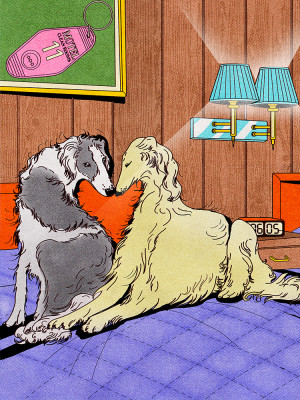
Should You Kick Your Pet Out of the Room When You Have Sex?
And what to do if you and your partner can’t agree on whether you should have an audience

Share Article
Curious? Jealous? Excited? Traumatised? Do pets even know what’s going on when they end up in the same room as people getting it on? Does your cat or dog watch you having sexopens in a new tab the same way you might watch two tigers humping away in a nature documentary? Or is it more like that time you walked in on your parents during birthday coitus and, for a moment, were too shocked to look away?
And what happens when you and your parter feel differently about whether said pet is allowed in the room during sexy time? What if one person doesn't feel comfortable with the judging eyes of a cat staring them down as they get naked? Perhaps, another feels like it’s a real mood killer to have to move a huge Australian Shepherd out of the room mid-make out.
This may not be a series of questions we want to ask out loud or confront, but someone needs to, so let’s dive in.

littleKin™ is Kinship’s home just for puppy and kitten parents. Bop over to check out expert advice, new pet tools, and special deals—all curated for your newest family member.
opens in a new tab*Names have been changed at the request of sources.
Let’s start with cats: will your kitty freak out if they see you doing it?
“Not exactly,” says certified feline behaviour specialist Dr Marci Koskiopens in a new tab. “Honestly, I don’t even think cats know what sex is. And their response really depends on the cat and what kind of sex you’re having.” For instance, cats will often run away if things are getting too active, but it’s not because they disapprove or anything, she explains. “Often cats view the bedroom as a place to sleep and snuggle down, so if something active is happening (like sex), then the room is no longer conducive to that, and they may choose to leave.”
Not every cat is going to respond to sex, active or otherwise, in the same way, though. And while they might not necessarily be judging you for having it, that doesn’t mean they don’t have feelings about who it is happening with.
“I’ve brought a lot of guys home over the years,” says NYC-based cat dad Michael*. “And I’ve learnt to just keep my cat, Felix, out of the room until it’s all over. Most of the time, he’s fine, but I’ve also known him to jump up on the bed and investigate, which is usually more funny than anything, but also kind of distracting.”
He recalls one time when Felix came in and started sniffing around the room and all over the bed. He was growling, and his fur was standing up on his body. “I’d literally never seen him do anything like that – he’s usually the sweetest cat ever – but when I picked him up and tried to introduce him to the guy, he hissed and wriggled away. I definitely think he was jealous. Then again, the guy later told me he didn’t like cats, so maybe the feeling was mutual.”
Dr Koski explains that unfamiliar people can be disconcerting to cats. “There are some cases where cats will think something bad is happening and jump in to protect their human,” she says. “Again, probably under circumstances where things are getting really active in bed. In that case, their fight-or-flight instinct might kick in and they might choose to fight, even though the action taking place is not directed at them.”
Don’t worry; they’re probably not traumatised
But even if your cat does get upset enough to jump in, that doesn’t mean they’re traumatised. They’ll get over it. Although, in the meantime, you might want to keep them out of the room.
Then again, closed doors can sometimes pose their own problems. “Cats generally hate closed doors,” says Dr Koski. “They get FOMO, I think. They know that someone or something is on the other side, and they are not being included, and so they want in. But, again, it really depends on your cats personality.”
So, you’re damned if you do and damned if you don’t. But at least you don’t have to worry about causing your cat any sort of lasting damage. In or out, your cat will be fine. They might not be happy, but they’ll be fine.
What about dogs? Will they need to go to canine therapy after this?
Does your dog understand what’s happening when you and your partner start going at it? Or are they, like cats, more concerned with the novelty or vigour of the act than the act itself?
“Contrary to what their facial expressions might imply, when it comes to humans having sex, dogs don’t really know what’s happening,” says Jessica Jacobsonopens in a new tab, a dog behaviour expert and certified trainer in NYC, whose clients include Madonna, Scarlett Johansson and Brooke Shields.
But just because they don’t really know what’s going on, doesn’t mean they don’t have feelings about it. “Dogs can have a huge variety of responses to their parents’ sexual activities,” Jacobson says. “From trying to get involved in some way, to trying to ignore it, to even barking or whining. But these behaviors do not mean they understand [what their humans are up to] per se, even if it seems like they do.”
Their reaction is probably not even about what you’re doing
Whatever your dog’s response to sexual intercourse is, it’s probably something you’ve seen them do before under other, less erotic circumstances.
“A dog’s behavioural responses are built over time,” says Jacobson. “And often, they exhibit the same behaviour in different situations hoping for a certain response. For instance, there are quite a few studies, like this oneopens in a new tab, that show dogs who ‘look guiltyopens in a new tab’, for example, are only displaying this behaviour because they want their human to go easy on them and have learnt that this expression will achieve that result.”
That said, it is possible for your dog to exhibit signs of distress when they see you having sex, even if they don’t know exactly what it is they are looking at.
“You have to read your dog’s body language,” says Jacobson. “Sometimes, the signs are obvious: pacing, shaking off, excessive barking, excessive shedding, growling or even biting. But more subtle signs like yawning, avoiding eye contact, licking of the lips or urogenital (self) licking, can also be displayed and are just as important as the more obvious ones.”
So, should you keep your dog out of the room while you are having sex? “Only if you or the dog are uncomfortable,” says Jacobson. “And only if the dog is OK with being behind a shut door. If they’re not OK with either situation, then you should seek help to find out what’s really going on, so you can take steps to fix it.”
What if only one of you wants them out of the room?
“When my now husband, Jerome*, and I first started dating, I kept a set of stairs beside my bed so my Poodle, Sir Pork, could climb up,” says Baltimore dog mum Michaela*. “Then, one night, while we were making out, Porky started humping Jerome’s leg. I thought it was funny, but Jerome was really freaked out.”
Situations like this can cause friction in a relationship, especially if there is poor communication or either party is too rigid. “Pet ownership is already very emotionally loaded and sex is often a loaded issue, too. So, together, they can be a volatile combination,” says licensed mental health counsellor Kelly Scott of Tribeca Therapyopens in a new tab.
Scott has encountered this particular issue a few times in her practice and finds that it is often emblematic of other, deeper issues in the relationship.
“There was one couple I worked with where there was a lot of aggression in the relationship,” says Scott. “He would raise his voice and name call, while she was more passive aggressive, but just as much so. He didn’t want the dog in the room when they were having sex and she did, and they would often fight about it.”
Scott says that it turns out the man had erectile dysfunction and was actually concerned the dog would distract him and create further issues. But there was yet another twist: “Meanwhile, it came out that she was actually letting the dog into the room to avoid having sex with him. And this exact dynamic played out across their whole relationship.” Needless to say, that couple eventually parted ways.
Chances are, this conflict is probably about something else
That story isn’t necessarily the norm. Per Scott, what is more often the case, is that one person is having an issue and feels like they are asking for something simple and doesn’t understand why their partner isn’t saying yes. On the other hand, it’s possible that the person advocating to let the pet remain in the room feels that they are expected to acquiesce to their partner's requests too often and has thus decided to take a stand on this particular issue. They are simply tired of giving up ground.
“This sort of issue could really be rooted in anything,” says Scott. So, it’s worth digging deeper to get to the underlying issue. That said, Scott has some advice for people looking to minimise friction when dealing with this particular issue.
“Approach the conversation with as much neutrality as possible,” she adds. “Don’t go in assuming it’s going to be a fight and really take some time beforehand to think about what you’re feeling and why you’re feeling it, so you can communicate that to your partner.”
And whatever you decide: in the room or out, on the bed or off, your pet doesn’t really know what you’re doing anyway. You’re not traumatising them one way or the other, so give yourself a break and focus on, um, other things.

Charles Manning
Charles Manning is an actor, writer, and fashion/media consultant living in New York City with his two cats, Pumpkin and Bear. Follow him on Instagram @charlesemanningopens in a new tab.
Related articles
![an illustration of a cat with various cat chores: being groomed, scooping the litter box, feeding the cat]() opens in a new tab
opens in a new tabWhat to Do When Your Partner Isn’t Pulling Their Weight With Your Pet
So you don’t have to be annoyed anymore
![a white dog stares up at a pink dress and yellow dress waving outside in the wind on a clothing line]() opens in a new tab
opens in a new tabWhen Is It Too Early to Get a Dog Together?
You’re in love, but is it irresponsible to add four paws to the mix?
![An illustration of 2 dogs on a bed]() opens in a new tab
opens in a new tabThree’s a Crowd: When One Partner Doesn’t Want the Dog in the Bed
You want them to cuddle up; your partner doesn’t. Here’s how to handle the great bed debate
![A woman with black hair and green sunglasses hugs her brown Doodle dog]() opens in a new tab
opens in a new tabShould You Put Your Pet In Your Dating Profile?
Apparently it’s a great way to find a match





